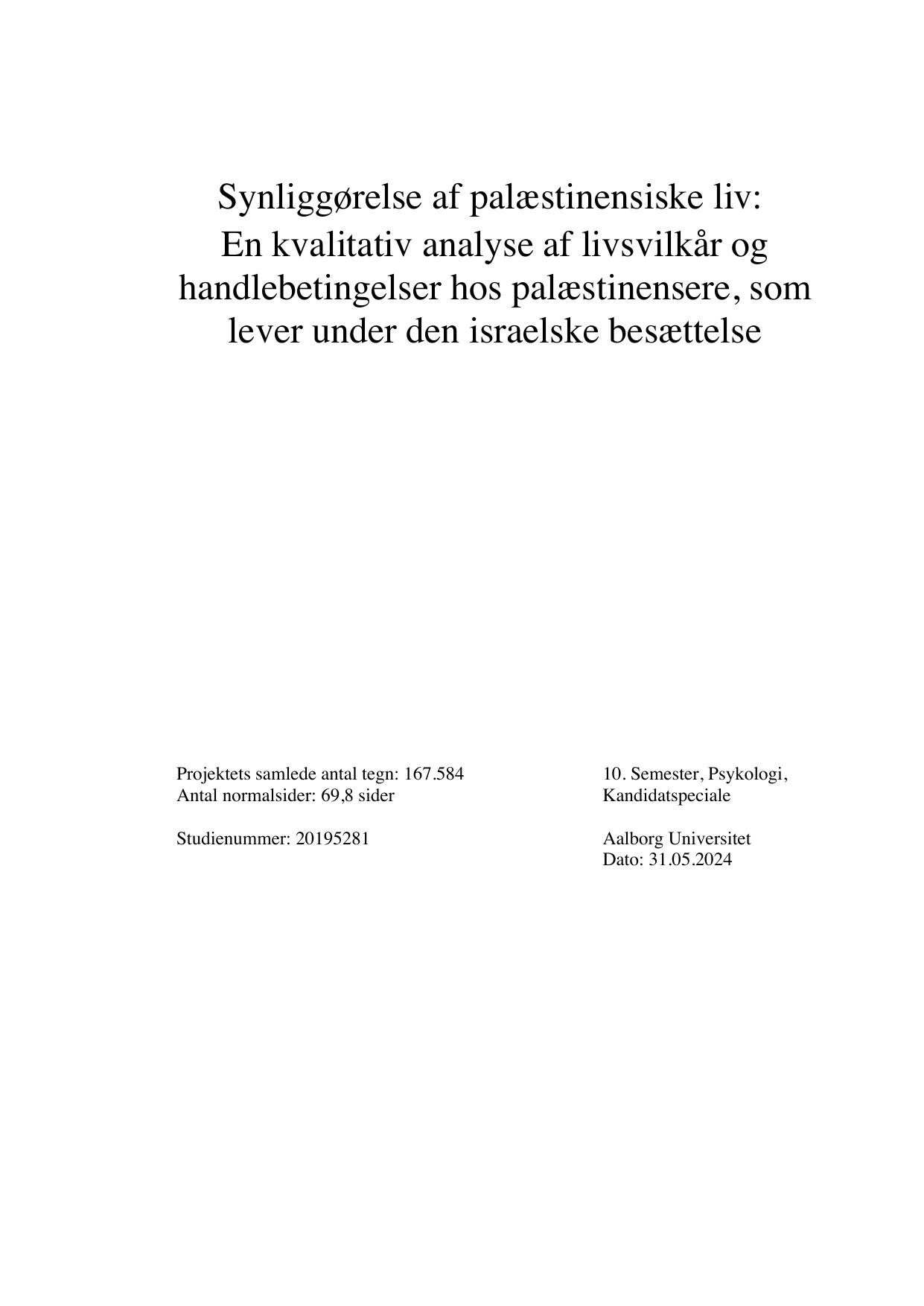
Synliggørelse af palæstinensiske liv: En kvalitativ analyse af livsvilkår og handlebetingelser hos palæstinensere, som lever under den israelske besættelse
Oversat titel
Highlighting Palestinian Lives: A Qualitative Analysis of Living Conditions and Conditions for Action of Palestinians Living Under the Israeli Occupation
Forfatter
Semester
4. semester
Uddannelse
Udgivelsesår
2024
Afleveret
2024-05-30
Antal sider
69
Abstract
This master’s thesis is a qualitative, empirical analysis that seeks to understand how the Israeli occupation affects the living conditions and conditions for action of Palestinians living in the West Bank. The project takes on a dialectical materialist approach in order to take into consideration important aspects regarding historical as well as material conditions. In my initial review of the research literature, I found that precisely factors such as historical and material conditions surrounding Palestinians’ lives are missing in the field of psychology. In order to situate the living conditions and conditions for action of the informants, I first begin with a historical contextualization of events dating from the creation of Zionism as a political ideology in the late 1800s to the newest escalations of this century. I conducted two online semistructured interviews with two different informants living in the West Bank. Through a thematic analysis, I find that three main themes appear consistently for both informants: 1) socio-material conditions, 2) practices of oppression, and 3) belonging and identity. I apply different concepts and theories to be able to approach the living conditions and conditions for action of the informants with a dialectical understanding of the informants and their environment. The theoretical concepts that I employ are in relation to dialectical materialism, yet I also apply concepts regarding belonging, identity, ruptures, individual and transgenerational trauma along with the concept of resilience. Throughout the analysis and the empirical discussion, I find that the informants’ lives and conditions for action are deeply limited because of the Israeli settler-colonial occupation. I argue that the impact of the Israeli occupation on the informant’s lives has led them to live in a state of precarity, which can be deemed as a stable instability that results in continuous ruptures that the informants have experienced. With limited access to water, electricity and freedom of movement and speech, I argue that these conditions affect several aspects of the informants’ everyday practices. These restricting factors are besides the checkpoints, the wall and the separated streets that segregate and oppress the informants. The living conditions of the informants are characterized by dangers and fear as a cause of the socio-material conditions imposed upon them. Fear of being killed and fear of imprisonment are omnipresent for both informants, as they describe how any action can result in either happening. I further argue that the above mentioned factors set the framework for their psychosocial reality, which is characterized by both individual as well as transgenerational trauma. On the basis of these traumatizing living conditions and the oppression that the informants endure, I reflect on how the informants continue to live their lives, and how they continue to work and study. I argue that their feeling of belonging to Palestine and Palestinians keeps them rooted to the land in spite of what the informants endure on a daily basis. This, along with the feeling of belonging to their respective families and faiths, is argued to strengthen their resilience. The informants remain steadfast and continue to hope for a better future despite the brutal conditions they live through. Paradoxically, their resilience can be seen to originate from both the hardships that the informants, and generations of Palestinians before them have endured and from their belongingness to Palestine, Palestinians and their respective families and religions. Finally, I discuss the methodological implications of interviewing informants in their second language, and I further discuss the methodological considerations I made when processing sensitive research. I also discuss the theoretical conceptualizations that are applied in this thesis. Here I argue that the mosaic of different theoretical backgrounds can be made available, as I’ve applied a dialectical approach. Keywords: Palestine, Israel, settler-colony, occupation, dialectical materialism, qualitative, empirical, West Bank, living conditions, conditions for action, sociomaterial conditions, trauma, war, ruptures, belonging, resilience
